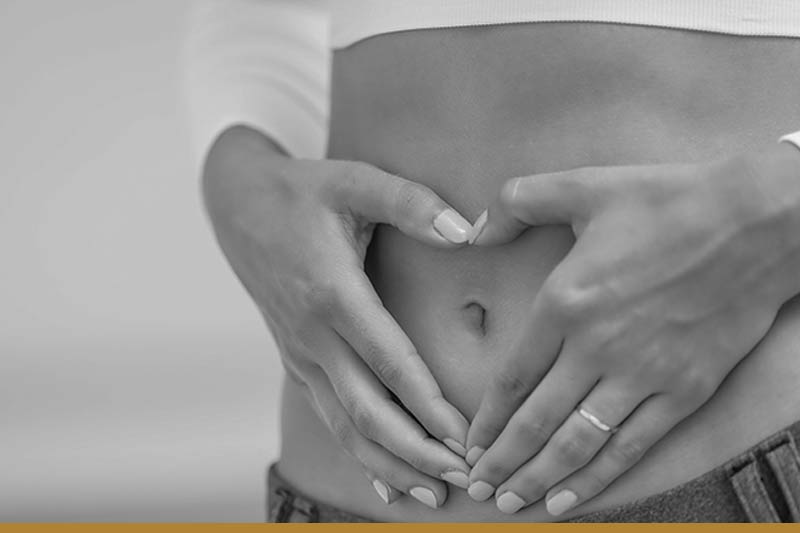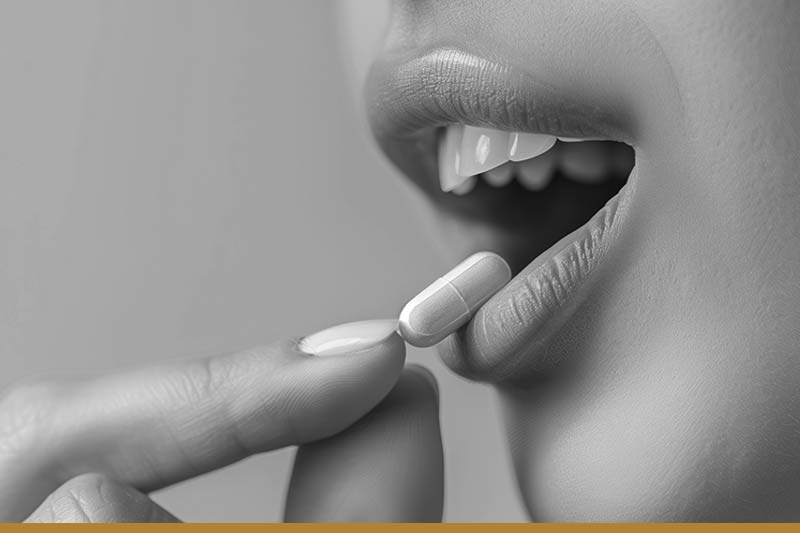Endometriosis is an inflammatory gynecological condition typically affecting women in their reproductive period. It occurs when cells similar to those covering the endometrium (lining of the uterus) grow outside of the uterus, in places where they don’t belong, such as the ovaries, bowel, and bladder.
Endometriosis can cause pain, excessive bleeding, and reduced fertility. It can also affect digestive health. Emerging evidence suggests a link between gastrointestinal and urogenital microbiota and the development of endometriosis.
This article explains how gut health and endometriosis are related and what treatments can help.

Doctors still don’t exactly know what causes endometriosis. One hypothesis is that endometriosis develops after repeated retrograde menstrual cycles – the flowing of blood upward into the pelvis instead of out of the body – which occurs in many patients.
However, they speculate additional factors play a role in the disease development and progression, including genetic, hormonal, and metabolic. Gut dysbiosis and other gastrointestinal disorders may also contribute to endometrial tissue implantation.
The gut microbiome plays a significant role in the pathogenesis of many diseases. Patients with endometriosis exhibit chronic inflammation and bacterial overgrowth in the gut and reproductive system, suggesting gut dysbiosis may trigger this inflammatory condition.
Gut dysbiosis refers to a disrupted gut microbiome balance. A reduced number of beneficial bacteria like Lactobacillus and an increased ratio of Firmicutes and other bacteria that cause vaginosis are associated with endometriotic microbiota.
Possible mechanisms by which gut dysbiosis affects endometriosis include immune activation, chronic inflammation, and damaged estrogen metabolism.
Estrogen is essential in regulating the female lower genital tract, including epithelial thickness, mucus secretion, and vaginal pH. A disbalance in the gut microbiota alters the estrobolome, a collection of microorganisms that regulate circulating estrogen. Dysbiosis increases free estrogen levels in the blood, stimulating the proliferation of female genital epithelial cells and endometriosis progression.
Note: Estrogen imbalance can lead to various health concerns. Learn about what happens when estrogen levels are low and what treatments can help.
Gut dysbiosis is known to decrease intestinal permeability, allowing pathogens to enter the bloodstream and induce inflammation. Research shows that the inflammatory microenvironment in the genital tract is closely associated with endometriosis. The disease is marked by fluctuations in proinflammatory and anti-inflammatory cytokines and chemokines, creating a state of permanent inflammation and promoting the proliferation of endometriotic cells.
The digestive tract hosts the highest concentrations of immune cells, such as T cells and macrophages. The gut microbiota participates in their differentiation and protects them from pathogens. A disbalance in gut microbiota diversity leads to a dysregulation of the immune cells and weakens immune function throughout the body, including pelvic immune function. It becomes ineffective at removing abnormal endometrial tissue.
The gut microbiome stimulates gonadotropin-releasing hormone (GnRH) neurons in the hypothalamus, which help regulate the production of sex hormones, including estrogen. Gut dysbiosis may impact estrogen levels and promote estrogen-related disorders like endometriosis.
While gut dysbiosis, bacterial overgrowth, and inflammation are commonly observed in patients with endometriosis, it is still unclear whether dysbiosis triggers endometriosis or is a consequence of it.
Endometriosis is associated with gastrointestinal symptoms resembling those of irritable bowel syndrome, including bloating, cramping, pain, constipation, and diarrhea. Many patients with endometriosis have an increased risk of developing IBS.
Endometriosis affects gut health in several ways.
Endometriosis can cause the growth of endometriotic lesions in and around the bowel, causing abdominal pain and digestive issues like constipation, diarrhea, bloating, and gas.
Endometriosis may involve an increased number of prostaglandins – lipids with hormone-like effects. They help regulate the menstrual cycle, but excess amounts of these substances can cause intense pain and heavy bleeding and worsen the inflammatory response. This can exacerbate endometrial lesions and alter gut motility.
Estrogen plays a crucial role in digestive health. Excess estrogen, which occurs in endometriosis, can slow down digestion and cause bloating and constipation.
The medical community is currently struggling to diagnose endometriosis promptly because of its complex underlying mechanisms and atypical symptoms. Patients sometimes develop symptoms for over ten years before being diagnosed with this condition. Another problem is that the available procedures, like laparoscopy and histopathology, are limited and invasive. Doctors also use imaging technology like MRI and ultrasound, but it can fail to detect the presence of pathology.
Since scientists have discovered a link between gut health and endometriosis, they are exploring more non-invasive approaches using intestinal, fecal, and genital microbiota as diagnostic markers. Potential promising biomarkers include Escherichia coli and Shigella in fecal sampling, Ruminococcus and Pseudomonas in intestinal and peritoneal fluids, and Enterobactericaea and Streptococcus in cervical mucus.
Additional studies are needed to validate the reliability of using microbial biomarkers in the early detection of endometriosis.

Options for treating endometriosis currently include surgical excision of lesions, hormonal therapies, and medications like NSAIDs. However, patients report a high rate of recurring endometriosis after surgery. Hormonal therapy also carries the risk of side effects. The medical community is exploring new, microbiome-based treatments and calling for an interdisciplinary approach to managing endometriosis.
Improving gut health is emerging as a promising therapeutic approach for various diseases, including endometriosis. It can alleviate chronic inflammation present among endometriosis patients. Strategies for restoring microbiome balance include dietary interventions, probiotics, antibiotics, botanical remedies, lifestyle changes, and fecal bacteria transplantation.
The composition of intestinal flora directly depends on our diet. Certain nutrients, such as vitamins and minerals, protect beneficial microorganisms, while refined sugars and trans fats stimulate the growth of harmful pathogens.
Research shows the following dietary schemes may help decrease the risk of developing endometriosis:
Note: Anti-inflammatory diets can help improve many medical conditions, including gut, heart, and mental health concerns.
Probiotics are live microorganisms in fermented foods and probiotic supplements which promote microbiota homeostasis. They are increasingly used for various disorders related to imbalanced gut microbiome, because they inhibit the growth of pathogens, protect the intestinal barrier, and enhance the immune system.
Studies show specific bacteria are particularly beneficial for endometriosis patients, including Lactobacillus gasseri, Lactobacillus acidophilus, Lactobacillus plantarum, and Lactobacillus fermentum.
More studies are needed to determine the best probiotics administration routes and dosage to counter dysbiosis and provide optimal long-term results.
Note: Our medical professionals have designed a special gut-supporting formula to heal compromised gut microbiome. Vibrant Biome contains carefully selected probiotic strains to increase intestinal flora diversity and support a healthy immune and digestive system.
Antibiotics are an effective treatment for bacterial infections. Since many endometriosis patients exhibit increased pathogenic bacteria, such as Streptococcus bovis and Escherichia coli, doctors commonly prescribe antibiotics with probiotics.
Botanical drugs are being explored as a gentler treatment option for endometriosis patients, providing soothing, anti-inflammatory effects with fewer side effects than conventional medications. Some of the most studied herbs and plant extracts for gut health and inflammatory-related conditions include kudzu vine, black garlic extract, resveratrol, curcumin, and catechin. More studies are needed to confirm the safety and effectiveness of botanical drugs for endometriosis management.
Lack of sleep, high stress, alcohol, cigarettes, and other unhealthy lifestyle choices damage the gut flora diversity and integrity. Adopting the following habits can help improve the microbiome’s composition and regulate inflammation:
Fecal microbiota transplantation (FMT) is a surgical treatment for gastrointestinal, blood, metabolic, and other diseases. It is the process of transferring healthy people’s fecal bacteria into the GI tract of patients with dysbiosis. In the future, it might become a treatment option for endometriosis since a link between gut dysbiosis and endometriosis has been established.
Recent research on the gut microbiome explores novel treatment options for diseases that are difficult to treat, such as endometriosis. By restoring gut flora homeostasis, endometriosis patients may avoid surgery - which currently has a high recurrence rate - and reduce reliance on medications that often cause side effects.
While further studies are needed to confirm the effectiveness of gut-targeted treatments for endometriosis, adopting healthier dietary and lifestyle habits may support overall wellbeing and symptom management.




4325 E Indian School Rd, Suite 130
Phoenix, AZ 85018
United States
(480) 422-2058
info@vibrantvitalityclinic.com
Monday - Friday: 9:00 am - 6:00 pm
Saturday: 9:00 am - 3:00 pm
Sunday: Closed
